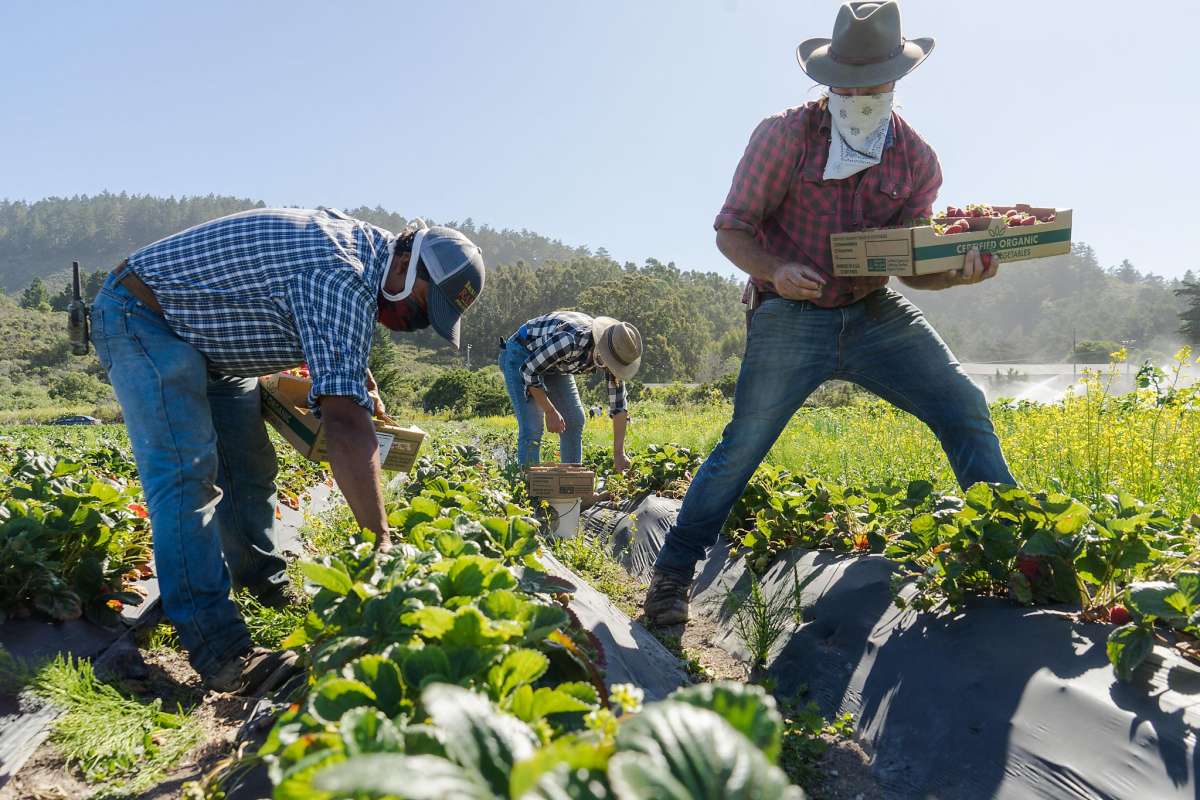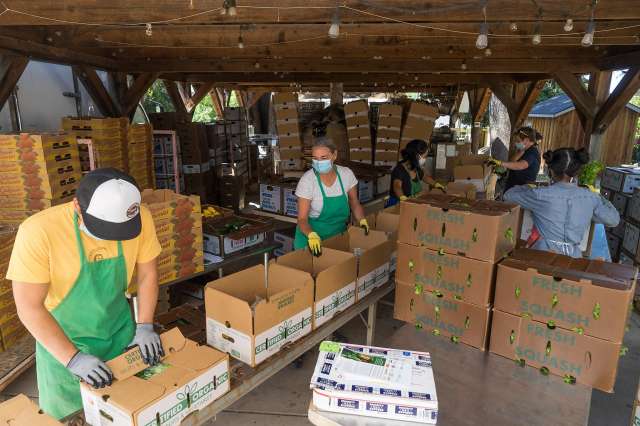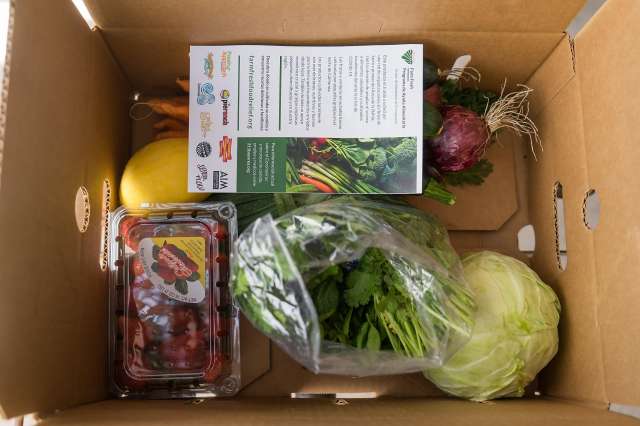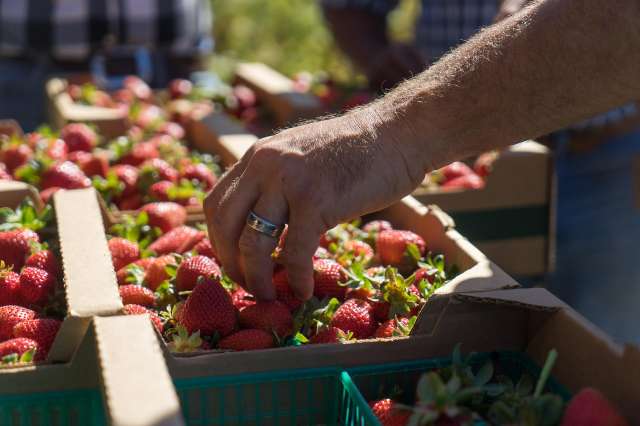As Bay Area restaurant business drops, local farms send produce to struggling families

Cristobal Cruz (from left), and Veronica and Cole Mazariegos-Anastassiou pick organic strawberries at Brisa de Anõ in Pescadero. The food will be packed into boxes and donated to low-income families.
Photo by James Tensuan / Special to The Chronicle
June 28, 2020
Early every Wednesday morning, trucks loaded with fresh organic produce converge at a farm stand just outside of Pescadero. The produce comes from small farms scattered from the hills across Monterey County to coastal San Mateo County. Usually, the kale, asparagus, strawberries, arugula and countless other delicious fresh ingredients end up at farm-to-table restaurants in affluent neighborhoods from San Francisco to Santa Cruz.
But the “table” part of that equation has been devastated by shelter-in-place orders — until very recently, no one has been dining out. And so, an unprecedented coalition of farmers is working together to ensure that much of the food that once wound up in some of the region’s finest restaurants is now going to low-wage workers and their families who are struggling to survive during the coronavirus shutdown.
After the fruits and vegetables are delivered to Pie Ranch, a nonprofit organic educational farm that normally hosts one of the largest organic farm stands on Highway 1, a team outfitted in aprons, masks and gloves will then spend the day packing the piles of produce into hundreds of boxes to give away as part of what it calls the Farm Fresh Food Relief Program.
“It’s been a big shift for me,” said Mona Urbina, the culinary programs manager at Pie Ranch, as she sorted bushels of mint and radishes, boxes of strawberries, and heads of romaine lettuce and broccoli into brown paper bags along a long metal table in the outdoor kitchen. Normally, she teaches cooking classes and runs an organic garden program in Pescadero’s schools, but after they closed, she started helping out packing the food every Wednesday.
Many of the farms that supply the Bay Area’s renowned organic cuisine are struggling to contend with the dramatically shifting marketplace.
“Some of the other farmers are having really difficult issues, especially the ones that market their crops mostly to restaurants and farmers’ markets,” said Javier Zamora, of California Certified Organic Farmers, a trade agency and association that certifies farms’ organic status. With many farmers’ markets and most restaurants closed, some farms have lost their main markets. But, said Zamora, who is chapter president of the association’s Central Coast region, which includes San Francisco and San Mateo counties, “We have to stay productive, whether we sell most of our items or not.”
The approach in Pescadero enables the farms to not only keep growing food as their traditional revenue streams collapse, but also ensures that the food goes to the people who are experiencing the financial brunt of the coronavirus-related shutdowns.

Masked and gloved volunteers pack CSA boxes at Pie Ranch, a nonprofit organic educational farm in Pescadero. Photo: James Tensuan / Special to The Chronicle
What started as a ragtag effort in March, supported by local grants from individual donors and organizations such as the Silicon Valley Community Foundation, was affirmed in mid-May by a U.S. Department of Agrigulture contract.
“We started at, like, a hundred boxes a week, and steadily added about a hundred a week,” most recently reaching 800 per week, said Andy Ollove, the food access program manager for Fresh Approach, the nonprofit facilitator of the project. Ollove said through Pie Ranch they’ve been delivering to nine sites — including low-income housing facilities, a Pescadero community center and a youth advocacy group in San Francisco.
With the USDA’s support, the project will expand to deliver produce to thousands of families in seven Bay Area counties through several new farming and nonprofit partners that were already operating programs similar to the one started at Pie Ranch. Farms are reimbursed for their produce at about the market rate they would be sold for.
Approval for the first USDA installment, for roughly $560,000, came in the end of May, and enabled the project to triple its weekly deliveries to about 3,200 boxes of produce. And just last week the second installment got a green light, for around $920,000, supporting the new farm network through the end of August.
One of the project’s delivery sites is the youth advocacy group Homies Organizing the Mission to Empower Youth (HOMEY) in San Francisco. The Mission District nonprofit, which before the pandemic was focused on professional development and violence prevention for Latinx youth living in San Francisco, has been delivering boxes of the produce packed at Pie Ranch to low-income families in Bayview, the Mission District, the Excelsior neighborhood and San Bruno since early May.
The advocacy group’s executive director Roberto Alfaro said that when shelter in place went into effect, they reached out to the families of the children they worked with and heard that many were concerned about access to food. The group put together bag lunches once a week for these families’ children, but soon realized they needed more. They tried food banks, but had little luck from service groups already inundated with requests.
The advocacy group reached out to farms and ranches for direct donations, and Pie Ranch responded the quickest. The farm group started out providing about 50 small bags a week to the Mission youth-advocacy group, and with the securing of more funding, the amount of produce has scaled up to 50 large boxes, to be delivered to these families the advocacy group has been working with. “I was like, ‘Holy s—, there’s all these boxes,’” said Alfaro. “It was pretty crazy.”
“The amount of love and generosity that people have right now at this moment is pretty overwhelming,” Alfaro said. “We’re just super excited to be a part of helping folks.”

One of the produce boxes packed at Pie Ranch in Pescadero to be distributed to low-income families.
Photo: James Tensuan / Special to The Chronicle
Initially, however, the project started because of the food insecurity within Pescadero’s own backyard. “Farm Fresh Food Relief Program started as a response to two needs in our community that we recognized were being unmet,” said Jered Lawson, who supervises the weekly pack out at Pie Ranch, “One, was a number of people, because of COVID-19, who were out of work, no income, were having a harder time accessing food.
“And then, we also are in a farming community and we know a number of farms that have lost markets,” Lawson said. “I see it as economic stimulus money on the one hand for farms, and hunger relief on the other.”
The community in Pescadero and the surrounding towns of Loma Mar, San Gregorio and La Honda is in dire need of this service. According to a 2017 Silicon Valley Community Foundation report, these four towns are home to about 3,000 people, mostly Latino farm and nursery workers and their families, as well as other low-income residents, located just 30 minutes from the wealth of Silicon Valley.
“Silicon Valley has so much opportunity to make change,” said Rita Mancera, executive director of development and administration of local community resource center Puente de la Costa Sur. “And it still doesn’t happen, and that is frustrating,” she said. “It’s hard for some people to live in this area. It’s a beautiful area. But there’s a lot of social and economic disparities.
“And then you have the entire challenge of being an agricultural region,” Mancera continued. “Wages are low, in general, and conditions are harsh.” These food donations, she said, are a great example of how the community came together to address this new challenge brought on by COVID-19.
The result can be seen every Thursday, a little after 11 a.m., when the community of now unemployed service workers and farmworkers, many with little or no social safety net, emerges from the residential areas scattered behind the often-touristy beach towns lining Highway 1. Dozens of cars line up outside Puente, which is nestled in the hills off Pescadero’s Main Street, for the noon curbside pickup of boxes of donated food, which include produce and other essential supplies, such as tampons.

Cole Mazariegos-Anastassiou sorts fresh strawberries at Brisa de Anõ, an organic ranch in Pescadero, to be included in boxes of produce to be donated. Photo: James Tensuan / Special to The Chronicle
A half dozen Puente employees and a couple of volunteers help load the boxes into the car trunks, or pass them through the passenger windows. Around 200 households make the drive every week.
While the Puente pickup is under way, more of the produce is being delivered to other sites such as residential facilities for low-income or disabled people, as well as schools and food pantries, by Fresh Approach trucks. They have all come to rely on these supplies.
Pie Ranch’s Jered Lawson hopes the partnerships from this project are just the beginning. The COVID-19 crisis, he said, “accelerated, or amplified, the need for more community food resilience. When supply chains are disrupted at the level at which we’re witnessing nationally and globally, it really crystallizes the need for a more local, more resilient food system.”His hope is to set up the systems that will enable these relationships to keep going, and not just until the next pandemic.
“In any crisis, you realize that it’s the community that’s going to carry you through,” said Lawson. “We may have to be physically distant, but it really is about social solidarity that will enable us all to get through this together. And so, having this kind of program, it really creates a stronger feeling of, ‘we can do this.’”
Natalia Gurevich is a student at the UC Berkeley Graduate School of Journalism. Email food@sfchronicle.com



